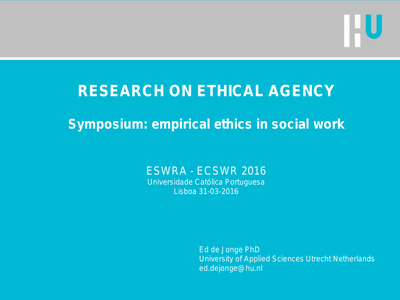Een bezinning op de identiteit en de positie van het Instituut voor Social Work van Hogeschool Utrecht.
DOCUMENT

Vergelijkende Europese studie in opdracht van Kees van Aken, toenmalig directeur van de opleiding Social Work i.o. van de Hogeschool Zuyd, naar welke verschillende varianten er mogelijk zijn als er gesproken wordt over een Internationale Bachelor Social Work - Maastricht. Op welke manieren zijn er in Europa reeds internationale bachelors zijn ontwikkeld. Het onderzoek moet een overzicht van enkele blauwdrukken van een Internationale Bachelor Social Work opleveren, om mede op basis daarvan een keuze te maken voor een (eventueel meerdere) voor Hogeschool Zuyd wenselijke variant(en) daarvan in Maastricht. Er is vergelijkend Europees onderzoek gedaan naar de verschillende filosofieën en organisatievormen van curricula International Social Work zoals die op verschillende Hogescholen en Universiteiten in Europa functioneren. Met name zijn “good practice” ervaringen onderzocht en met elkaar vergeleken, om op basis daarvan een aantal varianten helder te krijgen voor de opdrachtgever.
DOCUMENT

This research aims to contribute to a better understanding of strategic collaborations between work-integration social enterprises (WISEs) and for-profit enterprises (FPEs) with the joint objective to improve labour market opportunities for vulnerable groups. We find that most collaborations strive towards integration or transformation in order to make more social impact.
LINK
Column over de vraag: wil het Nederlandse “sociaal werk” nog wel een internationaal perspectief? Onder de titel "Social work in een international perspectief" is deze column uitgesproken tijdens het symposium “Samenleven is geen privézaak” op 29 maart 2012, ter gelegenheid van het afscheid Hans van Ewijk (lector sociale innovatie).
MULTIFILE

Because social workers respond to local contexts, it is often said that social work is not a global profession. Indeed, social workers adapt their practices to local conditions. However, these local practices are recognised globally. The exchange of these practices and methods enriches social workers, inspires them and strengthens the further development of the profession. To facilitate this exchange, social work has had several international associations and networks for almost a century, which have enabled the sharing of local practices and educational programs. Today, social work works within a basic international framework that guides both professional practice and education. This descriptive article will take the reader through the history of international social work, by mentioning some global social work associations and networks and their achievements. Furthermore, the article will address internationalisation of the social work curriculum and will mention the added values and disadvantages of an international experience abroad. (Includes an abstract in the Slovakian language)
MULTIFILE
Diversity implies variety. Diversity refers to the differences between people. Visible aspects – such as age, skin colour, gender, disability – and less or non-visible aspects such as cultural and social background, skills and competencies, and style of working. If you can handle diversity, you will be able to handle different kinds of people. The concept of ‘equality’ can be seen as opposite from the concept of ‘diversity’. Dutch society can be characterized as a culture of equality. Due to increasing diversity it is argued this culture of equality will eventually turn out to be unfavourable. A culture of diversity is reasoned to be an inevitable alternative. A first exploration of the characteristics of such a culture and its significance for the work of the Social Worker is being done at present.
DOCUMENT

Symposium ESWRA - ECSWR 2016: empirical ethics in social work. Objective: ethical aspects of social work (esp. at home) Structure: cooperation of the research group of UAS Utrecht Netherlands with six regional welfare organizations Method: practice based ethics research Focus on professional practice: learning from moral experiences in frontline practice (cf. Van Doorn, 2008) Hybrid approach: combining theoretical resources and professional practice (cf. Banks & Gallagher, 2009) Mixed methods: desk research, interviews, best practice units (BPU), development of ethical tools
DOCUMENT

Boekbespreking van 'Social work: een constructieve benadering'
DOCUMENT

In het werkveld van sociaal werkers wordt al volop gewerkt met ervaringsdeskundigen. Om toekomstige sociaal professionals hierop voor te bereiden, mag ervaringskennis niet ontbreken in het curriculum van de social work-opleiding. De behoefte onder docenten en studenten is er. Echter de inbedding gebeurt mondjesmaat. Hoe kan het onderwijs zich tot dit thema verhouden en wat is de beste aanpak? Sonja Liefhebber spreekt met de leden van de themawerkgroep Ervaringsdeskundigheid in het onderwijs, van Werkplaatsen Sociaal Domein. Onlangs voerde de werkgroep een inventarisatie uit onder 19 hogescholen social work.
LINK